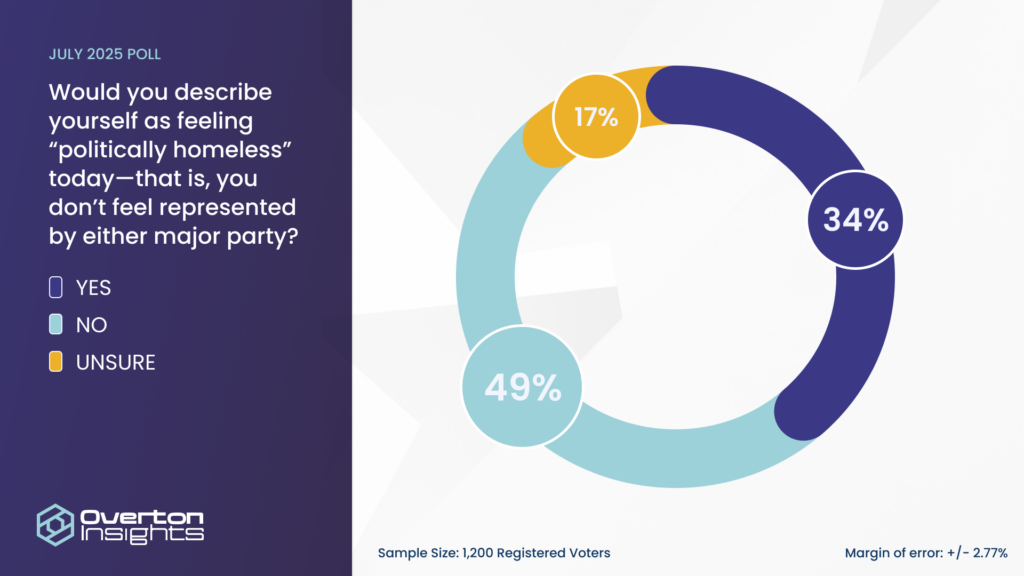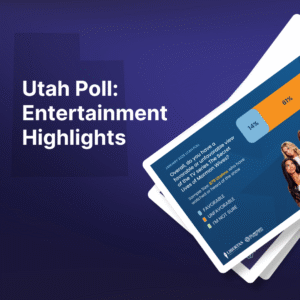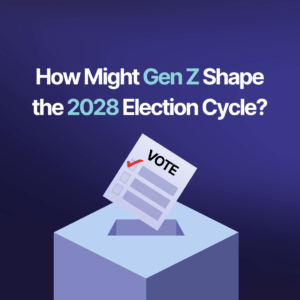
The Polling Alley Recap: The Outlook in Texas
In this episode, the team discusses upcoming Texas Senate primaries, voter sentiment towards Economic Fairness, and results from our latest Overton Inights poll.
President
Targoz Market Research
A shocking 34% of registered voters feel “politically homeless” today, meaning they don’t feel represented by either major political party. Just 49% of voters feel represented by either the GOP or Democratic Party, according to our latest Overton Insights Poll (June 23–26, 2025, MOE ±2.77%). This translates to over 50 million registered voters who feel unmoored in a polarized two-party system, a
bloc large enough to reshape American politics.

The politically homeless are far from a monolith. While 45% identify as moderates, they
also include 28% who are liberals, 20% who are conservatives, and 7% who lean
Libertarian or are unsure of their ideology. This group defies the stereotype of Independents as mere centrists. Many liberals and conservatives believe their parties have lost touch with their values. More than two in five (44%) identify as Independent when it comes to party affiliation, and 45% think both major parties are equally corrupt, signaling deep disaffection with the two-party system.
Among self-identified Independents and Politically Unhoused:
Discontent among the politically homeless spans politics, economics, and personal well-
being:
Younger generations are especially disillusioned. Among Gen Z voters, 40% identify as politically homeless, followed by 34% of Gen X, 33% of Millennials, and 31% of Boomers.
Many politically homeless live on the economic edge, with more than one in five (22%) working as freelancers or contractors and 13% primarily relying on freelance or contractor gigs for their income. Millennials are especially likely to freelance as a primary source of income (19% vs. 9% overall), reflecting economic realities that fuel disengagement from major parties. It’s not just an income issue. Among registered voters who feel politically homeless, more than one in three (34%) are renters. By generation, only 55% of Gen Z and 65% of Millennials own homes, compared to 74% of Boomers.
Despite perceptions of apathy, the politically homeless are active. More than half (52%) always vote, and 28% say they nearly always vote, which is close to the 57% of all registered voters who report always voting.
In 2024, 37% of this group backed Donald Trump, though only 29% approve of his current performance as President, while 56% supported Kamala Harris. When asked about a rematch of the 2024 election, 18% preferred someone else, signaling a demand for alternatives. At election time, this bloc is searching for the “lesser evil.”
In a hypothetical 2028 matchup of Vice President J.D. Vance vs. Charles Barkley, the former NBA star turned analyst, Vance leads registered voters 43% to 34%. But among the politically homeless, Barkley wins by 13 points. This group is seeking a candid, non-political, and authentic outsider. Remember, our current President was a political novice and TV personality before 2016, which fueled his support. A large part of the country is done with establishment Republican or Democrat candidates.
With only 49% of voters feeling represented by either major party and 44% of the politically homeless identifying as Independent, this group is a potent electoral force. Their 18% preference for a third option in a repeat of the 2024 Presidential election underscores their potential to disrupt the two-party system.
As Gen Z and Millennials, who dominate this group, become the majority of voters by 2036, their estrangement could fuel third-party growth, much like the U.K.’s Reform Party continues to gain traction among voters disillusioned with the Tories and Labour.
For Republicans, the challenge is to deliver a robust economy with more affordable housing, particularly for Gen Z and Millennial registered voters, who both face low homeownership (55% and 65%, respectively) and economic precarity. Embracing pragmatic and less divisive policies as they head into the midterms, such as investing in tech infrastructure (with 40% support for AI data centers), could help recapture some of the disaffected voters.
Democrats, meanwhile, must shift from extreme ideological solutions to pragmatic fixes for housing, personal income growth, and gig economy protections to retain their edge with younger voters. Their focus on progressive ideological policies risks alienating a bloc that craves practical results over progressive dogma.

In this episode, the team discusses upcoming Texas Senate primaries, voter sentiment towards Economic Fairness, and results from our latest Overton Inights poll.

Utah voters have mixed opinions on sports franchise growth and changes, the 2034 Olympic logo, and the Secret Lives of Mormon Wives reality tv show

In this episode, the team discusses prediction markets, a surprisingly tight Ohio governor race, and what recent local elections reveal about the national political mood.

No clear leader exists within the Democratic Party, according to voters in the latest Overton Insights poll. How do politically homeless sentiments intertwine with this

The Polling Alley premieres today, a new Overton Insights podcast, where the team breaks down recent poll numbers and uncovers trends in the data. Tune

Gen Z voters are a highly influential demographic. Find out what this rising generation thinks about politics today.
Stay informed with the most up-to-date insights on public opinion. Be the first to know about shifting trends and key findings that matter to you.